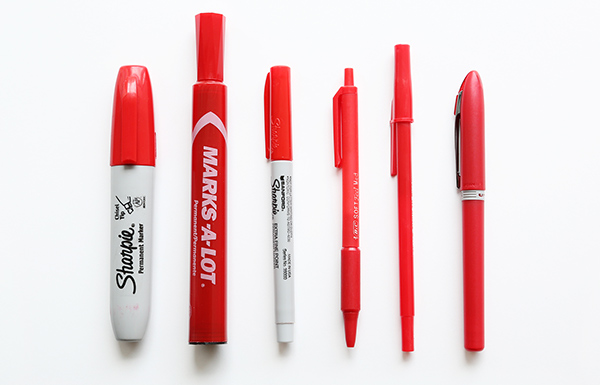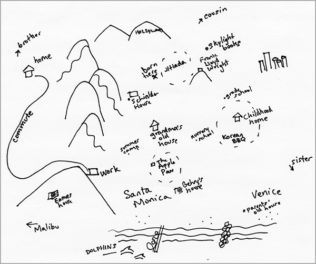
Throughout 2013, the Getty community participated in a rotation-curation experiment using the Getty Iris, Twitter, and Facebook. Each week a new staff member took the helm of our social media to chat with you directly and share a passion for a specific topic—from museum education to Renaissance art to web development. Getty Voices concluded in February 2014.—Ed.
Art museums are primarily about looking. So where does text fit in? In the age of the Web, are editorial standards still important, for museums and other cultural organizations? As museums evolve from gatekeepers of authority to facilitators of experience, where does accuracy fit in—not to mention correct punctuation?
My name is Linda Theung, and I’m an editor at the Getty Museum. You know those Today at the Getty Center and the Today at the Getty Villa sheets you get once you come on-site? Those come from my desktop. Same thing goes for all brochures and ephemera (editor-speak for print objects that aren’t books), including the Map and Guides you might pick up at the Getty Center or the Getty Villa. I’m also the core editor for materials from education and public programs—so if you’ve ever considered attending a lecture or read a theater program, we’ve been silently talking to one another.
Traditionally, editors have devoted their professional lives to text: making it interesting, accurate, readable, even humorous and (if we’re lucky) catchy. We are your advocates, making sure that what we publish for your eyes is understandable, enjoyable, and, at the absolute minimum, free of errors. But as the sheer volume of text in our lives increases thanks to the publishing revolution and social media, is the importance of editing actually ebbing? Are people like me who still painstakingly consult The Chicago Manual of Style just cranky fusspots? Really, does anyone actually notice if an em-dash is written as two hyphens in a Facebook status update? Do you even know what I’m talking about right now? Do you care?
Anyone who creates or edits for the Web faces a reality of short deadlines and fast turnarounds. Gone, or nearly so, are the multi-year schedules of pre-digital book publishing. Many of us who create and review content—a word editors tend to hate, but more on that later this week—are under intense pressure to produce as quickly as possible. In my own work, I’m forced to be increasingly nimble, both in terms of time and in what I’m willing to concede in a debate, something editors are not wont to do.
At the Getty we strive to uphold quality and accurateness in all we publish, while encouraging engagement and promoting learning. But can we do all those things while also working at Internet speed?




Art museums are about looking at what? No comma after “important.” Parallelism! It should be “attending a lecture or reading a program.” “Facebooking” is not a word; real words are in the dictionary. Is the text “good” enough? Since “good” is at the bottom of “good, better, best,” I would say that good is not good enough. Try well written, cogent, intelligible. Referring to words, writing, etc. as “text” is worse than calling it “content,” IMHO. Never once in my long professional career as an editor did I think I was dedicating my life to “text.” I could go on, but I’ll stop now.
Hi Mollie: As the editor of Linda’s piece and The Iris, and thus the one responsible for all infelicities of expression, faulty parallelism (which I should clearly state would never have crept in under Linda’s hand), and made-up words, I will gladly respond. Glad to see your editorial fervor!
The focus on the word “text” is intentional for a couple of reasons. First, we are talking specifically about words embodied in some tangible form, whether in print or digitally. We’re calling this “text” for lack of a clearer synonym. What word do you think would work better? We welcome input!
Second, we are asking the very question you seem to be bringing up, if I read you right: What is the role of the written word in today’s culture, in a climate increasingly saturated by “text”? (The Library of Congress has over 170 billion tweets in its archive, for example.) Does editing matter less in such a world, because volume, diversity of voices, and speed have their own merits? Or does editing actually matter more, because quality is on the decline (another assertion that may or may not be true)? As editors, we are asking these questions. We don’t know the answers. No one does, because there are no definitive answers.
In the spirit of full disclosure, I should state that I am biased by my own background as a linguist. Linguists are descriptivists at heart, not prescriptivists. So while I spend my professional life writing and editing “text” to agreed-upon standards, I also have no qualms about making up words. It doesn’t bother me one whit if a word I’d like to use is absent from Webster’s. If I think someone would understand that “word” (should we call it a “text string”?) and it fits the purpose, I use it. A word that’s not in the dictionary today may be there tomorrow, and vice versa.
Okay, that’s my counter-rant! 🙂
Mollie I found your critique to be unnecessary. Personally, I really enjoyed reading this piece for a couple of reasons. First and foremost, it raises an important question about the future of text. The article really makes you think about where it’s heading. There are so many people that are so caught up in social networking that I often catch people making modern mistakes such as using “u” instead of “you”, and I don’t blame them. If I were more active on social media, I would continue to write like that in other areas of my life too. With that said, I do feel that it’s important to raise awareness of this issue. That way, it can slowly get more attention and hopefully, one day, be properly addressed in schools. Additionally, I liked how the article pointed out that the world of the “web” holds no high regard to grammar. Instead, we are faced with “quick turnarounds” and “quantity” instead of quality text. I hope that there will be more articles like this that will raise awareness and hopefully make a difference in the way people use grammar. All the best, Tim. http://www.timla.net